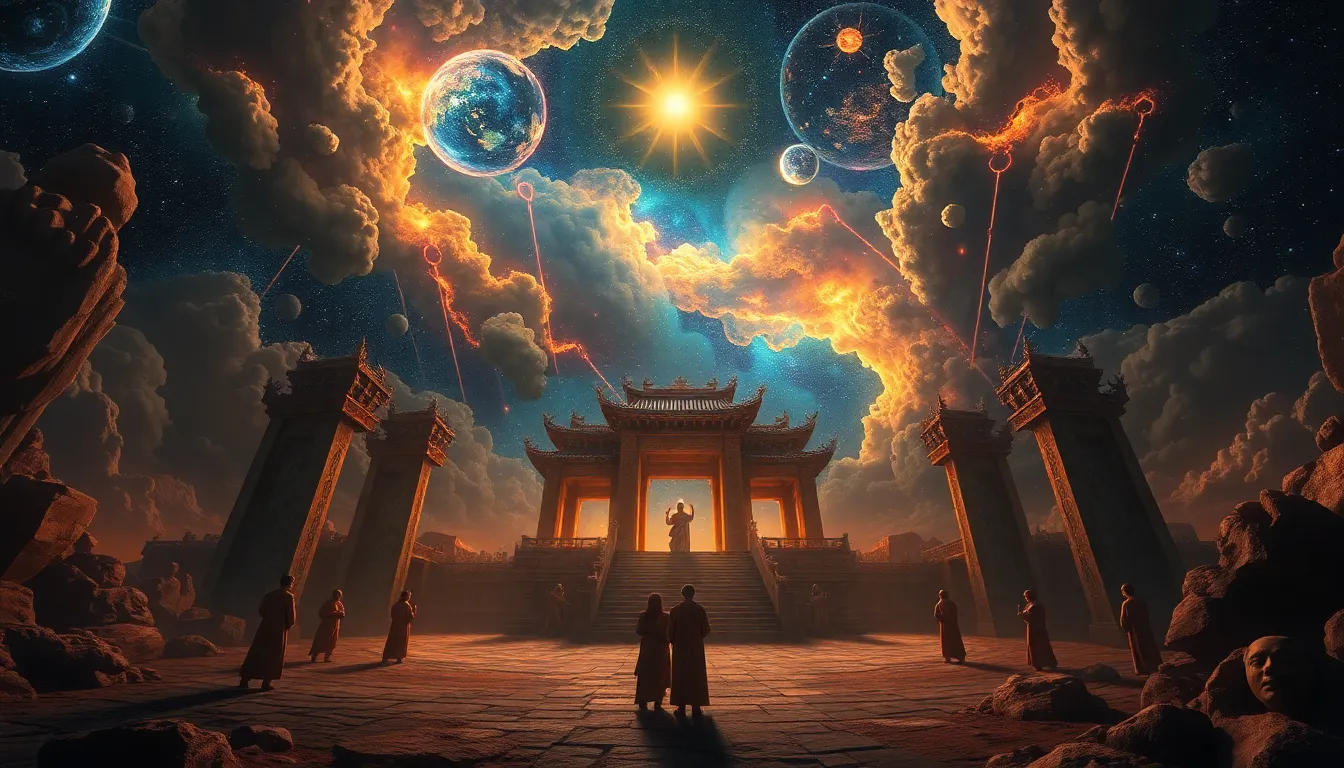The Legendary Kingdom of the Celestial Navigators: Myths of Guidance
I. Introduction
The Kingdom of the Celestial Navigators is a fascinating realm steeped in history and mythology, where the stars and their movements played a crucial role in guiding ancient mariners across vast oceans. These navigators, equipped with an intimate understanding of the heavens, were revered figures in their communities, often considered the link between humanity and the cosmos.
Navigation has always held immense importance in ancient cultures, as it enabled exploration, trade, and the discovery of new lands. This article aims to delve into the myths surrounding celestial navigation, exploring how these stories have shaped our understanding of navigation and the navigators themselves.
II. The Origins of Celestial Navigation
Before the invention of compasses and modern navigational tools, ancient civilizations relied heavily on celestial navigation to traverse the seas. This section explores the historical context of navigation and the early civilizations that turned to the stars for guidance.
A. Historical context of navigation before the invention of compasses
In the absence of modern technology, navigators had to develop a keen sense of observation and understanding of natural phenomena. Early methods involved:
- Observing the sun’s position during the day
- Tracking the phases of the moon
- Identifying constellations and their movements
B. Early civilizations and their reliance on the stars
Civilizations such as the Polynesians, Greeks, and Egyptians were pioneers in celestial navigation. They understood that the stars could provide direction and timing for voyages, and passed down their knowledge through generations.
C. The role of celestial bodies in myth-making
Celestial bodies were often personified in myths, embodying traits and stories that reflected the cultures’ values and beliefs. For instance, constellations were named after heroes and gods, linking navigation to the divine.
III. The Celestial Navigators: Who Were They?
Celestial navigators were skilled individuals adept at using the stars for navigation. This section defines who these navigators were and highlights some key figures from various cultures.
A. Definition and characteristics of celestial navigators
Celestial navigators were not only navigators but also storytellers, astronomers, and cultural custodians. Their characteristics often included:
- Deep knowledge of astronomy
- Exceptional observational skills
- Strong cultural ties to their communities
B. Key figures and legendary navigators in various cultures
Throughout history, several legendary figures have emerged as symbols of celestial navigation:
- Wayfinders of the Polynesian Islands: These navigators used the stars, ocean swells, and bird migrations to find their way across the Pacific.
- Homeric heroes: In Greek mythology, figures like Odysseus relied on the stars to navigate treacherous waters.
- The Viking navigators: Known for their daring voyages, they used the sun and the North Star as guides.
C. Comparison of celestial navigators across different civilizations
While the methods may have varied, the underlying principles remained the same. Each culture had its unique way of interpreting celestial signs, yet all shared a reverence for the cosmos that guided their journeys.
IV. Myths Surrounding the Kingdom of the Celestial Navigators
Myths play a crucial role in shaping cultural narratives. This section explores specific myths and their symbolism related to celestial navigation.
A. Overview of specific myths and legends
Numerous myths surround the theme of celestial navigation:
- The Legend of Maui: In Polynesian mythology, Maui is said to have used the stars to fish up islands from the ocean.
- The Odyssey: Odysseus’s journey is fraught with encounters that symbolize the trials of navigation.
- The Seven Sisters (Pleiades): In various cultures, this cluster of stars is linked to navigation and the changing seasons.
B. Symbolism and meaning of celestial navigation in these myths
These myths often symbolize guidance, exploration, and the quest for knowledge, reflecting humanity’s desire to understand its place in the universe.
C. The impact of these myths on cultural identity and storytelling
Myths of celestial navigation have served to strengthen cultural identity, providing a shared narrative that unites people and influences their understanding of the world.
V. Navigational Techniques in the Myths
Exploring the navigational techniques depicted in myths reveals the practical and symbolic aspects of celestial navigation.
A. Tools and methods used by the celestial navigators
Ancient navigators employed a variety of tools, many of which are echoed in myths:
- Star charts and maps
- Sun compasses made from wood or stone
- Simple instruments like the gnomon for measuring the sun’s shadow
B. Interpretation of celestial signs and their meanings
Celestial signs were interpreted in various ways, with stars representing different qualities and guiding principles, such as:
- The North Star as a constant point of reference
- Constellations that dictated seasonal changes and farming practices
C. The influence of mythology on navigational practices
Mythology often informed navigational practices, with legends guiding how navigators understood and utilized the stars in their journeys.
VI. The Role of the Cosmos in Guiding Humanity
The cosmos has always held spiritual significance for humanity, particularly in relation to navigation.
A. Spiritual significance of celestial navigation
For many cultures, the act of navigating by the stars was not just a practical endeavor, but a spiritual journey that connected them to the universe.
B. Myths as a metaphor for life’s journey and guidance
Many myths use the theme of navigation as a metaphor for life’s journey, illustrating challenges and the importance of guidance.
C. The intersection of mythology and astronomy
The blending of mythology and astronomy highlights how ancient peoples understood their world and the cosmos, shaping their navigational practices.
VII. Legends of Lost Voyages and Their Lessons
Lost voyages are cautionary tales that reveal valuable lessons about navigation and life.
A. Notable tales of lost navigators and their fates
Stories like that of the lost ships of the Viking fleet or the doomed voyages of early explorers serve as reminders of the perils of navigation.
B. Moral lessons derived from these legends
These tales often carry moral lessons about humility, respect for nature, and the importance of knowledge and preparation.
C. How these stories reflect societal values and fears
Legends of lost navigators reflect societal values, fears of the unknown, and the consequences of hubris in exploration.
VIII. The Evolution of Celestial Navigation Myths
As societies evolve, so too do their interpretations of celestial navigation myths.
A. Changes in the interpretation of these myths over time
Over centuries, myths have transformed, adapting to changing cultural landscapes while retaining core themes of guidance and exploration.
B. Influence of modern technology on ancient practices
Modern navigational technology has shifted reliance away from traditional methods, yet there remains a fascination with ancient practices.
C. The resurgence of interest in traditional navigation methods
In recent years, there has been a revival of interest in traditional navigation, with educational initiatives highlighting the wisdom of ancient navigators.
IX. The Legacy of the Celestial Navigators in Modern Culture
The legacy of celestial navigators continues to influence contemporary culture through various mediums.
A. Representation of celestial navigation in literature and film
Literature and film often draw on the themes of celestial navigation, portraying characters who seek guidance from the stars.
B. Continuing relevance of these myths in contemporary society
The myths of celestial navigation remain relevant, reflecting humanity’s enduring quest for direction and understanding.



